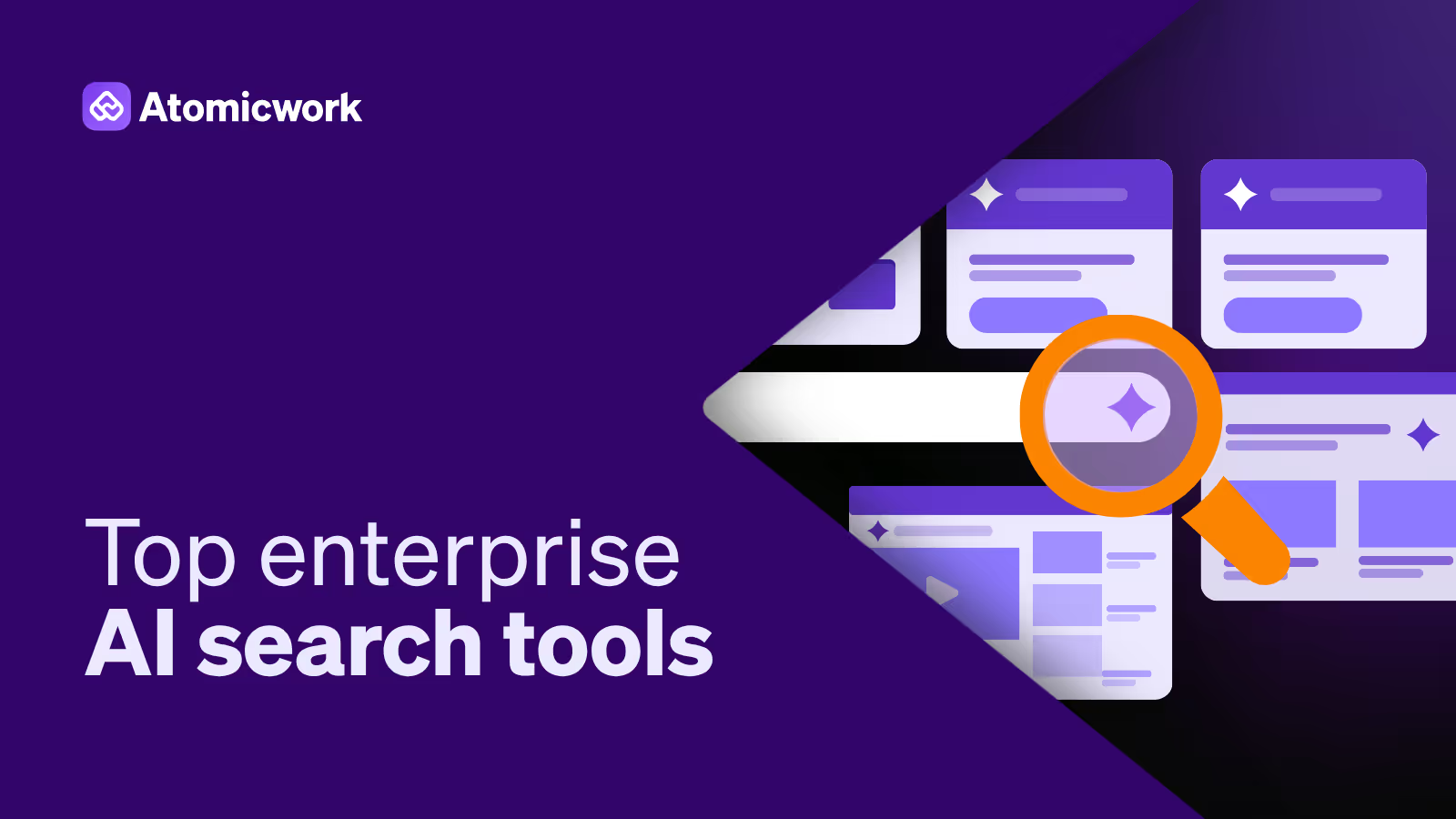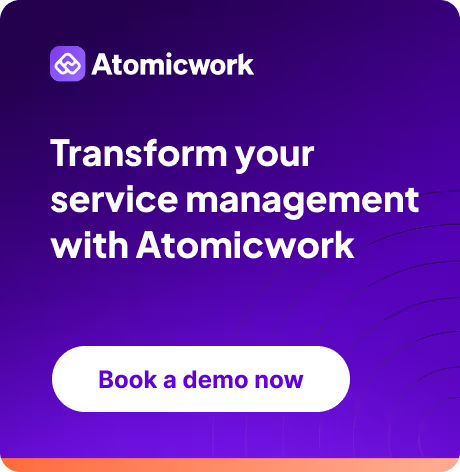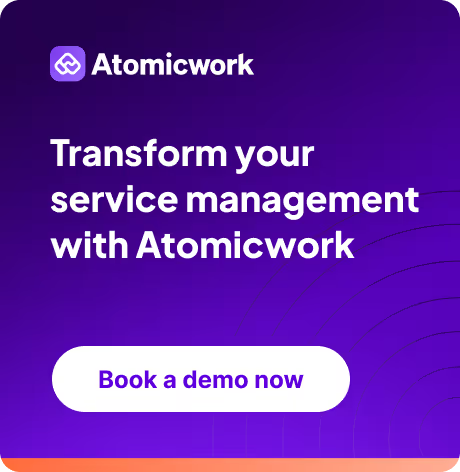15 Best Enterprise Search Tools for Modern Businesses in 2026
Large organizations, on average, manage data across 200+ applications, creating knowledge silos that cost IT teams hours of productivity each day. Traditional search tools that return long lists of files force employees to hunt through outdated documents, hoping to find the correct answer.
However, modern enterprise search has moved beyond simple keyword matching. Today's best enterprise search platforms use AI to understand intent, pull answers from multiple sources, and deliver actionable responses directly where teams work. Instead of searching through folders, employees get specific answers in Slack, Teams, or email within seconds.
For IT leaders managing fragmented knowledge ecosystems, this shift from search to AI-driven discovery represents a fundamental change in how organizations access and use their collective intelligence.
In this article, we'll cover what enterprise search really means, that challenges it solves, and how to evaluate the right enterprise search platform for your business.
What is enterprise search?
Enterprise search is the ability to find and access information scattered across multiple business systems from a single interface. Instead of hunting through SharePoint folders, Confluence pages, Slack conversations, and Google Drive files separately, employees can search once and get answers from everywhere.
Traditional enterprise search relied on keyword matching where you had to know the exact terms used in documents to find them. Modern enterprise search uses AI to understand what you're actually asking for, even when your words don't match the source content exactly.
At Atomicwork, we don't see search as a feature, but it's a fundamental piece of everything that we're building across the stack because we know that the fundamental problem is fragmented data and making sense of all that data for all kinds of AI applications across the enterprise. - Gautham Menon, Product Manager at Atomicwork.
The evolution from basic keyword search to AI-driven discovery solves a core enterprise challenge through context being the core of search.
When someone asks, "my WiFi isn't working," traditional search returns generic troubleshooting documents. AI-powered enterprise search understands who's asking (their location, device, team) and delivers targeted answers.
Key components of modern enterprise search
Modern enterprise search that is powered by AI relies on:
- Connectors and indexing - Best enterprise search platforms connect to 200+ data sources through pre-built integrations. They extract entities, relationships, and metadata to build searchable knowledge graphs.
- Role-aware, permission-based access - Enterprise search must respect existing security policies without forcing IT teams to rebuild permissions.
- Natural language and semantic retrieval - AI understands intent, not just keywords. Employees can ask "how do I request vacation time" and get policy answers, even if documents use terms like "time off" or "PTO."
- Embedding search in workflows - The best enterprise search tools work where employees already spend time—Slack, Teams, email, or their browser—reducing friction and increasing adoption.
Solving the enterprise search problem
IT departments often face the same painful reality: critical information lives everywhere, but employees can't find what they need when they need it. This creates cascading problems that drain productivity and increase support costs.
Enterprises end up with:
- Information silos and outdated knowledge: When you use over 200 applications, it’s clear that each app creates its own data silo. HR policies live in SharePoint, IT procedures sit in Confluence, and honest answers often hide in old Slack conversations. When information is duplicated across systems, teams end up working with outdated versions, leading to compliance risks and inconsistent messaging. Documents become stale, links break, and employees lose trust in official sources.
- Search results that lack relevance: Keyword-based search dumps lists of potentially relevant files, forcing employees to click through each one in the hope of finding the correct answer. Without understanding user intent, search becomes guesswork.
- Employee context switching: IT teams report that 70% of incoming requests involve finding information that already exists somewhere in the organization. When someone needs to leave Slack, open SharePoint, search through folders, then return to their original task, they've lost focus and momentum. The cognitive overhead of remembering where different types of information live becomes a hidden tax on productivity.
- Measuring ROI and search adoption: Many organizations implement enterprise search but struggle to prove value. Without analytics showing what employees search for, which results they use, and where searches fail, IT teams can't optimize the system. Low adoption often stems from poor search experiences—when employees get irrelevant results, they abandon the tool for familiar workarounds, creating a cycle of poor usage and worse results.
Here's a glimpse of the enterprise search tools solving these challenges with AI:
1. Atomicwork
Atomicwork is a modern service management platform, powered by it's Universal AI agent that unifies enterprise knowledge from 800+ trusted sources with permissions-aware access. The platform's AI uses contextual understanding of user location, device, and team membership to deliver targeted answers rather than generic troubleshooting documents.
With AI Search, employees can ask natural-language questions like "my WiFi isn't working" and receive specific solutions tailored to their organizational context.
Atomicwork unifies knowledege management with:
- A Universal AI Agent, Atom that has multimodal capabilities like voice and vision AI to support employees with contextual answers pulled from different knowledge sources like Confluence, SharePoint, Google Drive, and more.
- It respects the source permissions and smartly truncates and aggregates answers for quick resolution of end user queries.
- The Universal Context layer powers every search answer with user, device, workflow logic, and support history context.
Atomicwork achieved impressive results with Cohere's integration, improving accuracy by 20% with Rerank and reducing latency by 75% compared to competitive models. The platform's adaptive learning engine evolves without manual tuning, automatically flagging outdated documentation and identifying content gaps across enterprise systems.
Try Atomicwork for true AI-powered enterprise search today!
2. Coveo
Coveo is a semantic search platform combining machine learning with natural language processing for personalized, context-aware results. Strong for unifying customer and employee search experiences with case deflection tools and real-time indexing across commerce and support systems.
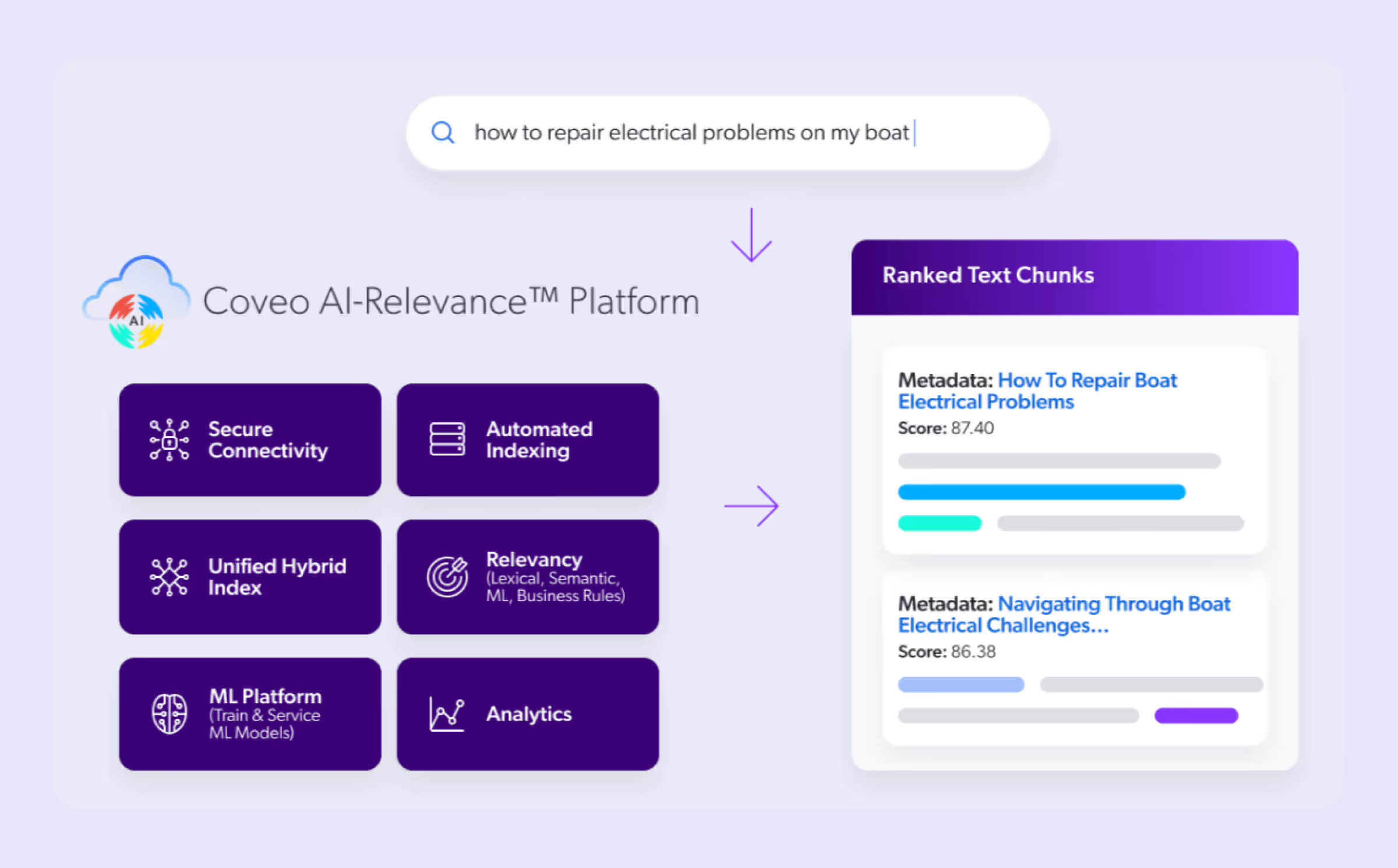
3. Glean
Glean is an integration-first platform with 100+ enterprise connectors, specializing in personalized search based on user roles and permissions. Delivers fast setup across work apps with AI-powered relevance that adapts to individual usage patterns and organizational context.
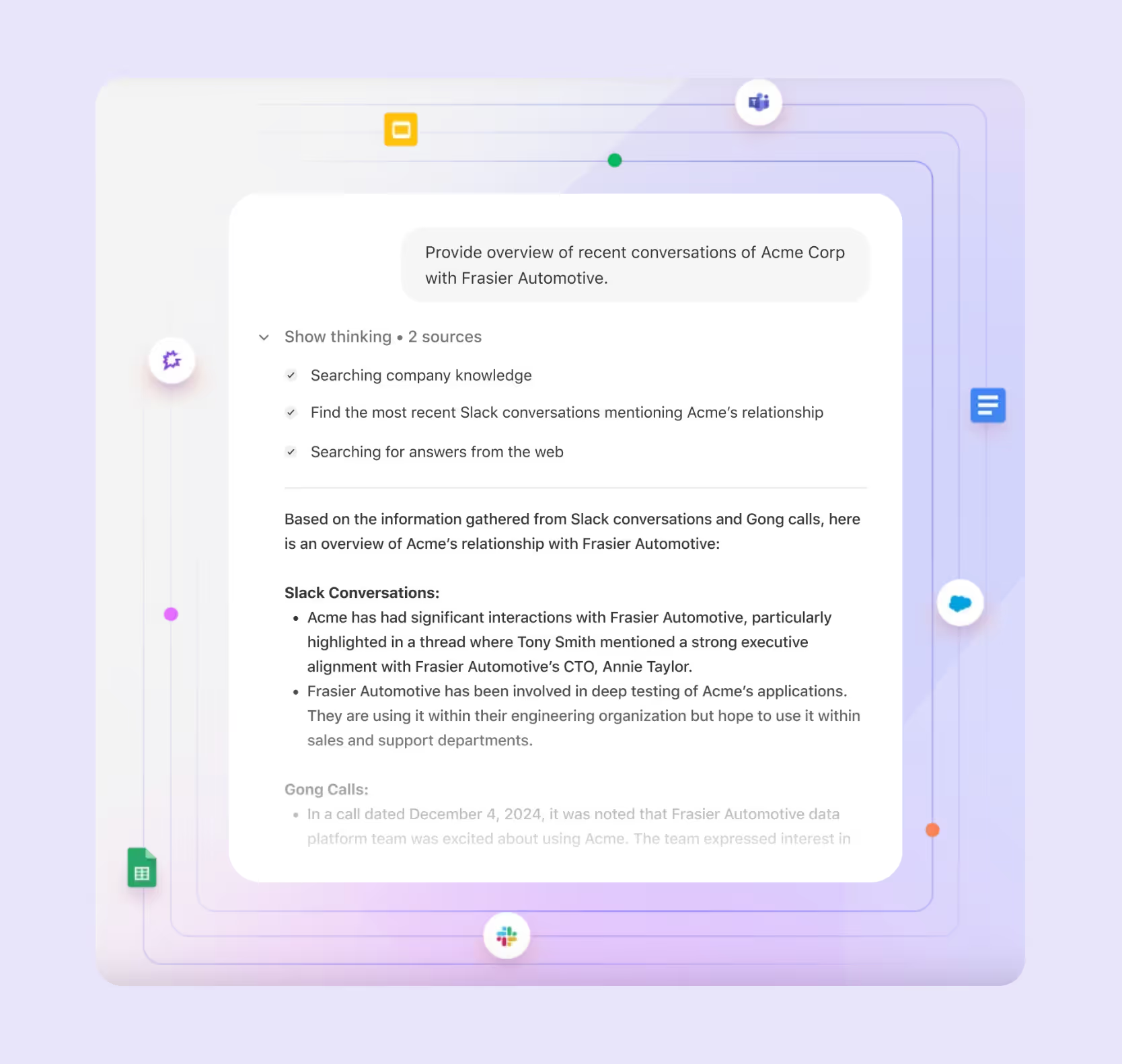
4. Algolia
Algolia is a high-speed search API platform optimized for eCommerce and customer-facing applications. One of the use cases they support is enterprise-level searchStandout features include typo tolerance, relevance tuning, and fast response times under 100ms, making it ideal for product discovery and user experience optimization.
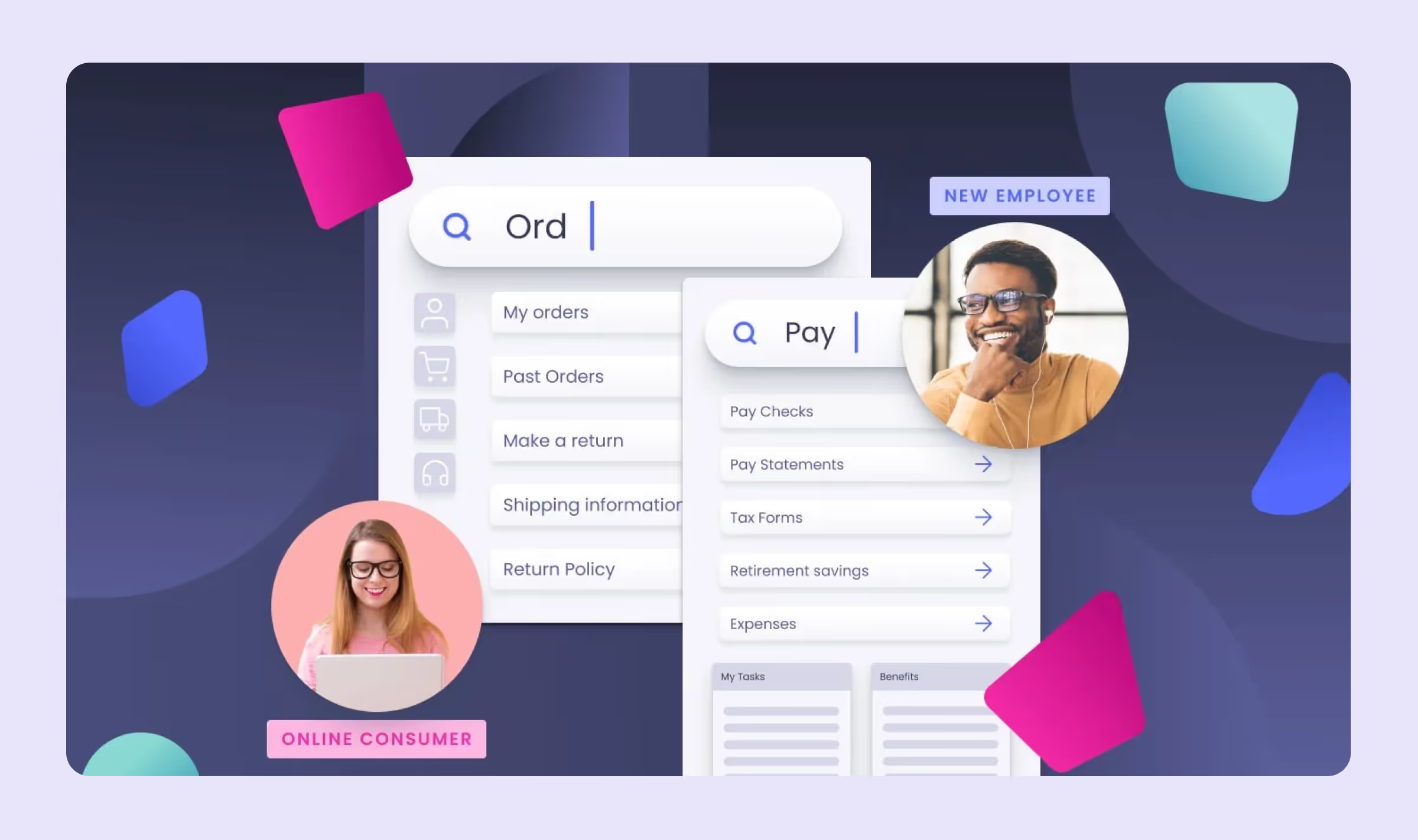
5. Guru
Guru offers knowledge capture and verification platform with strong Slack and browser integration. Focuses on verified, up-to-date information with team-based knowledge ownership and real-time content validation to prevent outdated or incorrect answers.
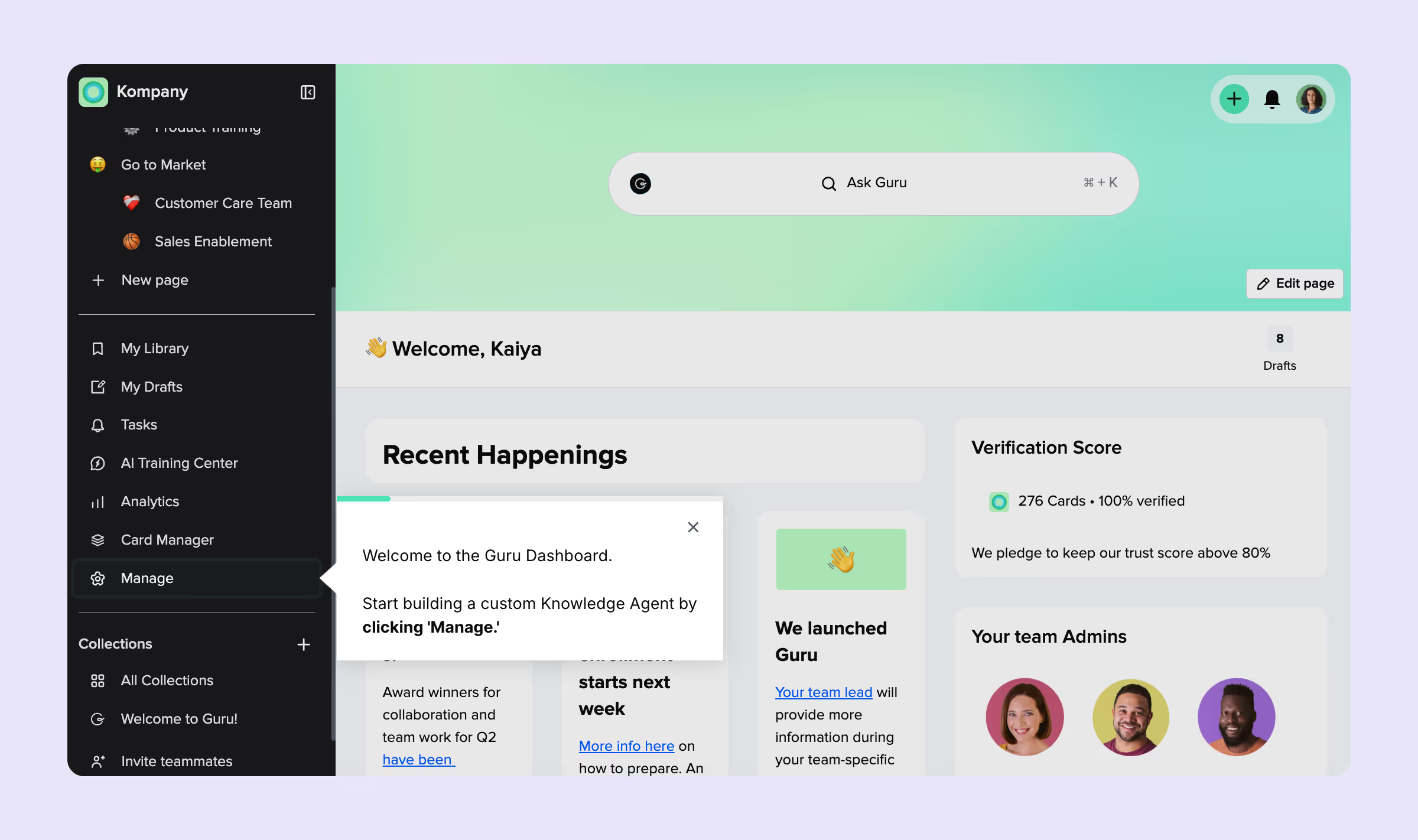
6. Elasticsearch
Elasticsearch is an open-source search engine built for large-scale data indexing and complex queries. Best for developer teams needing customizable search infrastructure with horizontal scaling, real-time analytics, and flexible data modeling across structured and unstructured content.
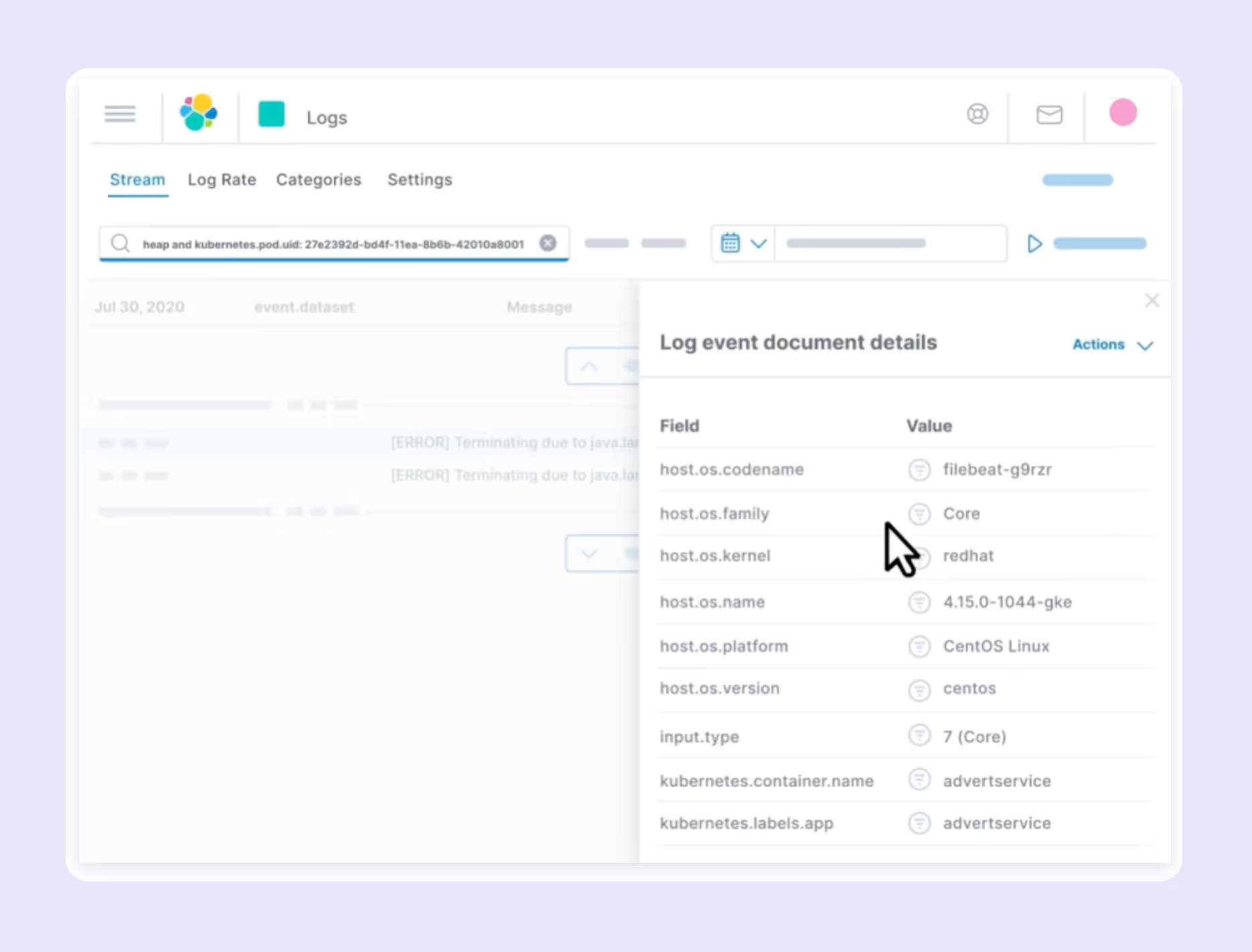
7. Google Cloud Search
Native search for Google Workspace with AI-powered query understanding and semantic retrieval. Automatically indexes Gmail, Drive, Docs, and Calendar, and supports third-party connectors for hybrid environments using existing Google authentication.
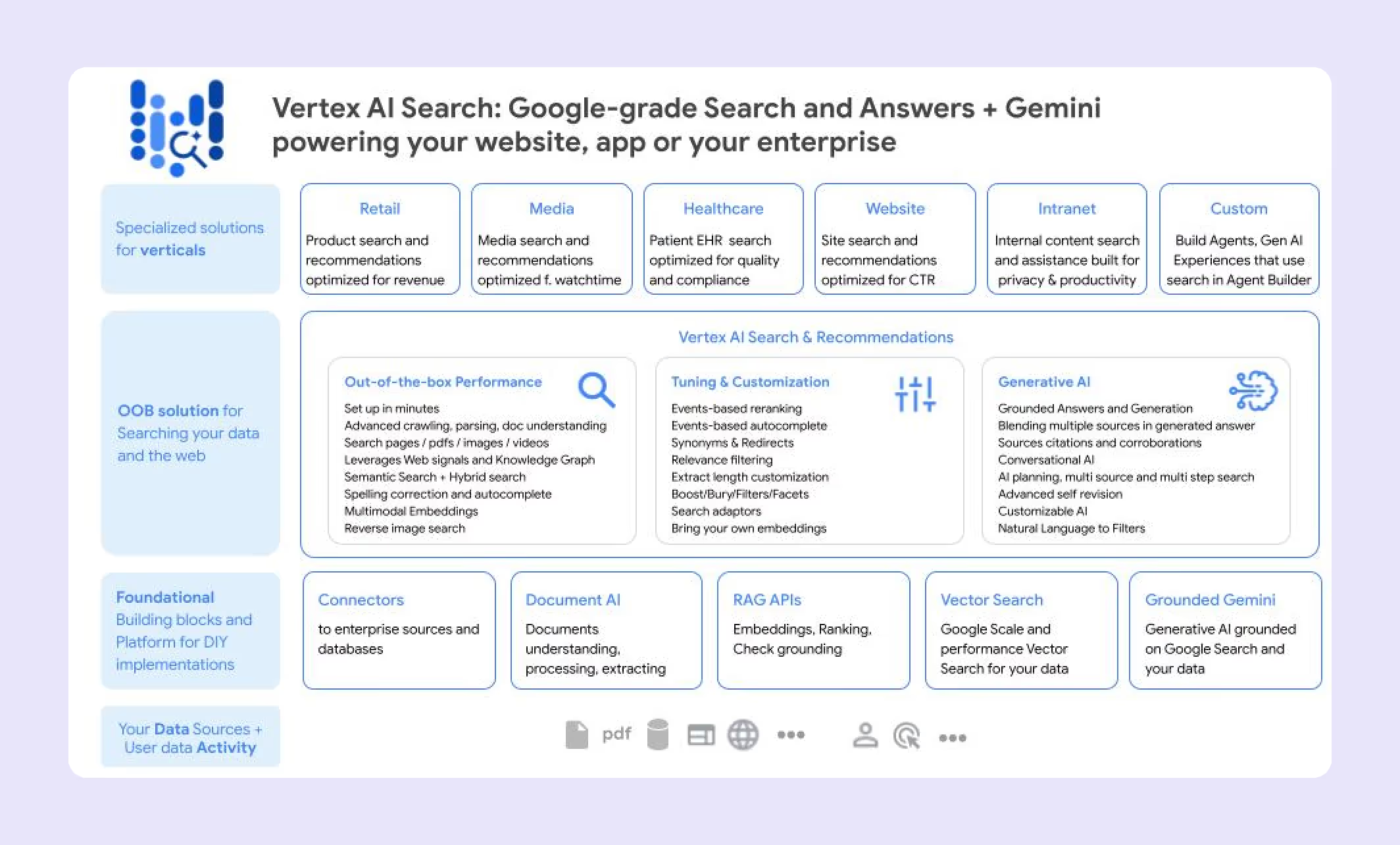
8. IBM Watson Discovery
IBM Watson Discovery is an enterprise AI search and insights platform that uses natural language processing to find, organize, and analyze information that enables organizations to extract actionable insights from documents, emails, and knowledge bases through conversational or search interfaces.
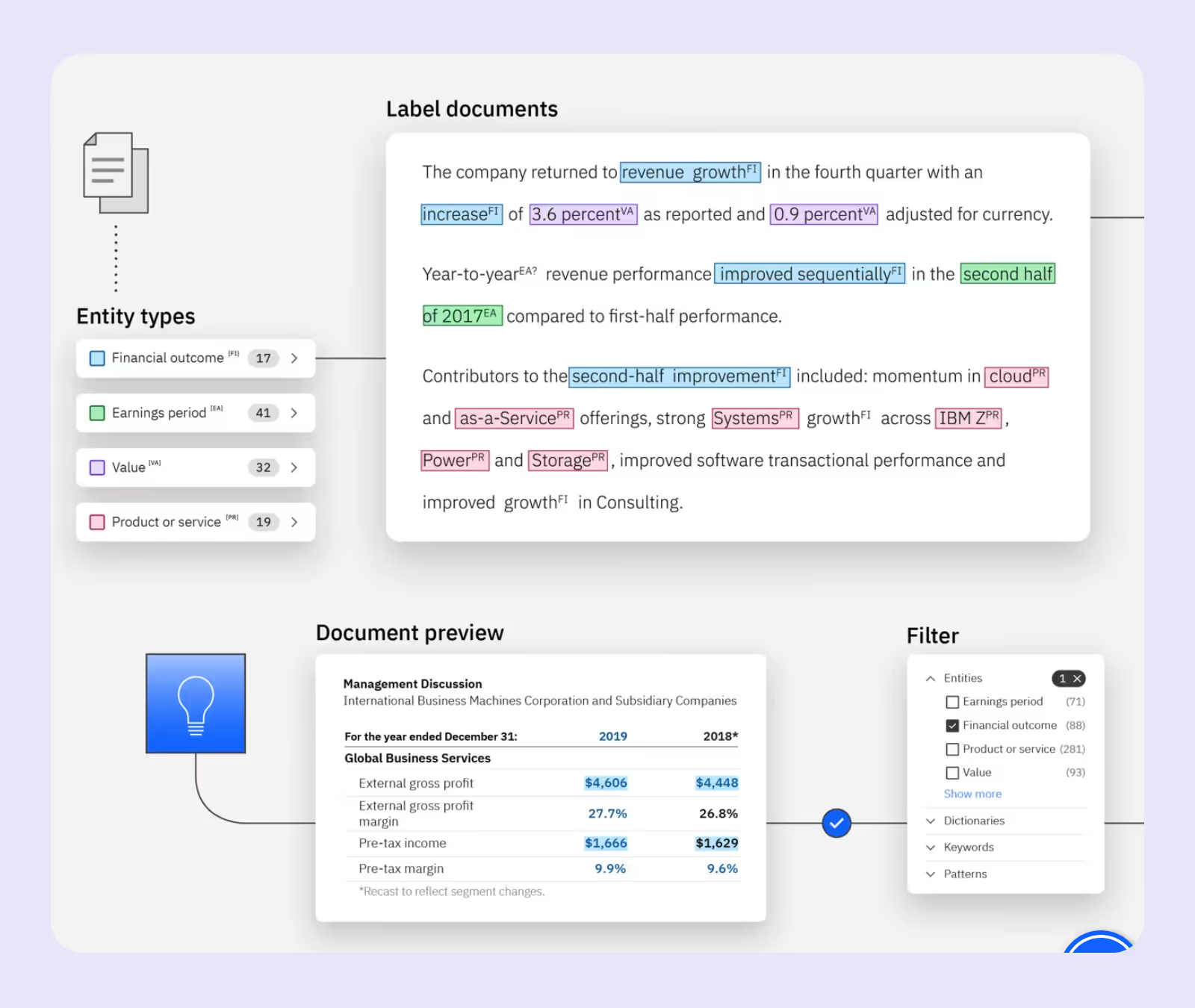
9. Lucidworks
An AI-powered search platform combining machine learning with traditional relevance, Lucidworks is tuned for complex enterprise environments. Offers granular control over search behavior and supports both internal knowledge discovery and customer-facing search applications.
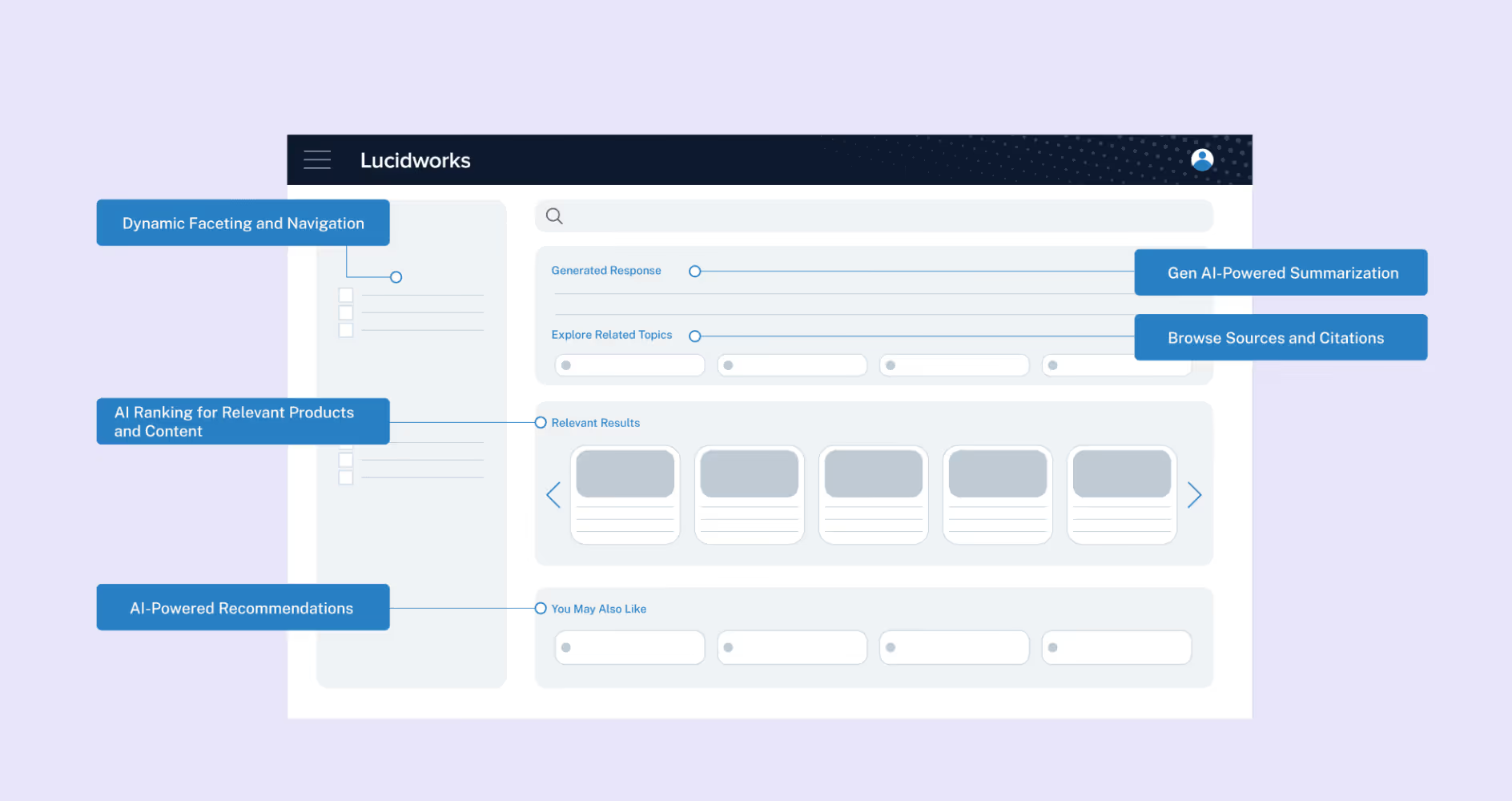
10. Moveworks
Moveworks is an agentic AI assistant platform that offers enterprise AI search capabilities that let employees find answers, policies, and resources across systems like Confluence, SharePoint, and ServiceNow using natural language within chat tools like Slack or Teams.
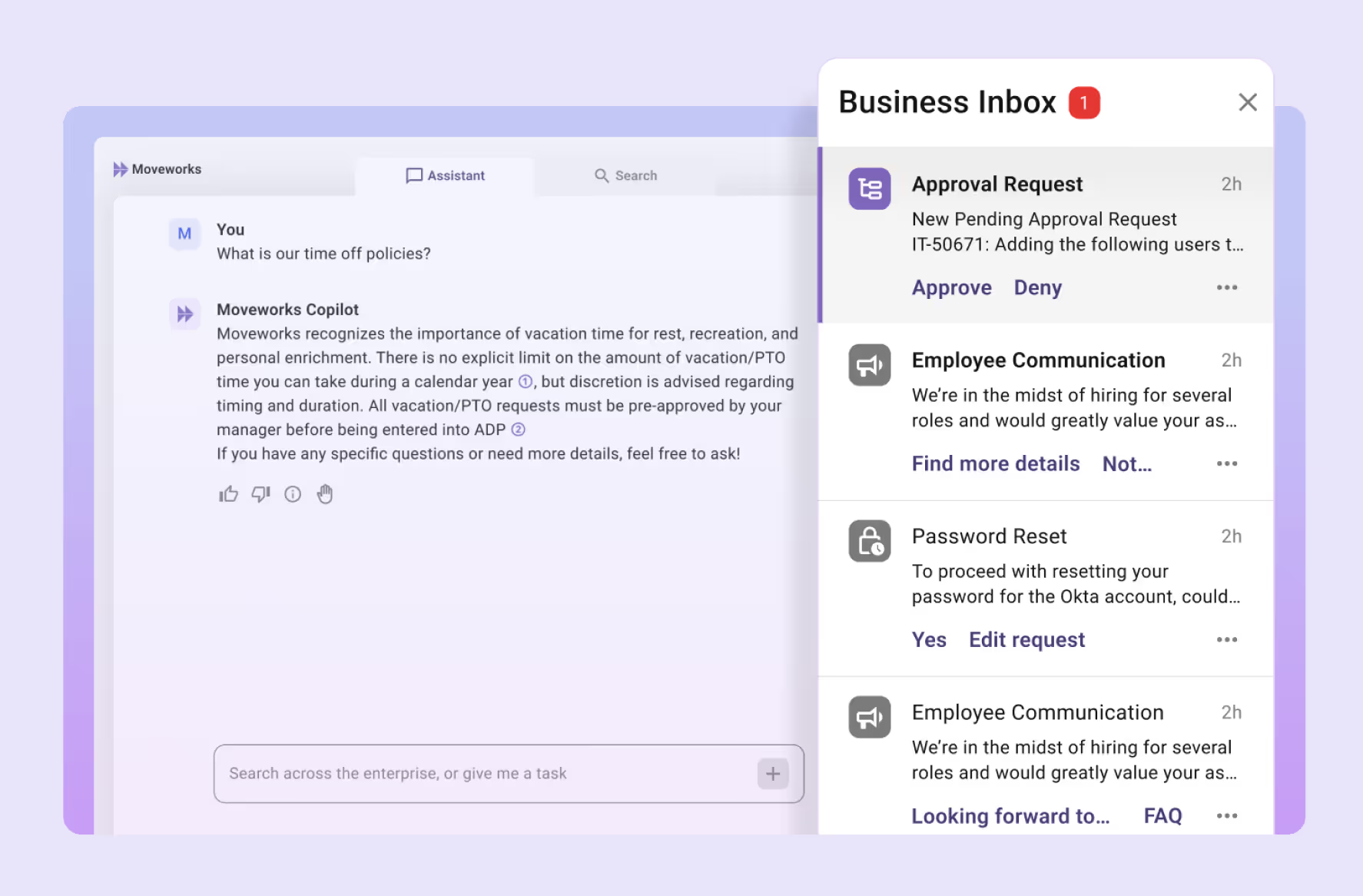
11. SearchBlox
SearchBlox comes with 300+ connectors and built-in AI features, including PreText NLP for automatic metadata generation. Offers hybrid search, RAG capabilities, and SmartSuggest AI autocomplete with transparent fixed pricing and rapid deployment.
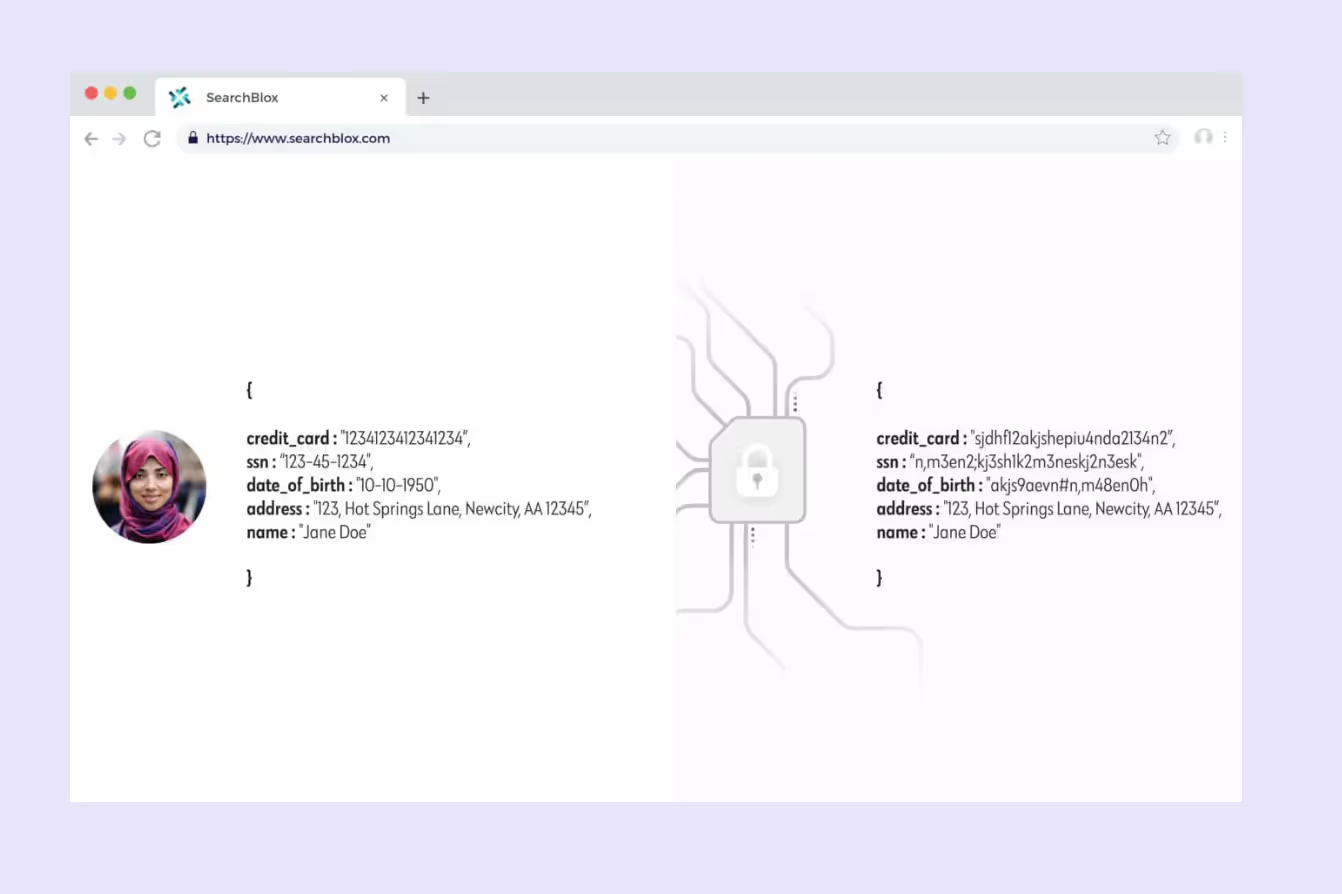
12. Sinequa
Cognitive search platform specializing in unstructured data processing with advanced analytics and insight generation. Strong for regulated industries requiring comprehensive audit trails, complex document analysis, and enterprise-grade security compliance.
13. Credal
Credal is a secure AI agent platform designed for multi-step workflows across enterprise systems like Salesforce and Slack. Focuses on permission synchronization, PII protection, and multi-agent collaboration while supporting custom LLM integration and hybrid deployment options.
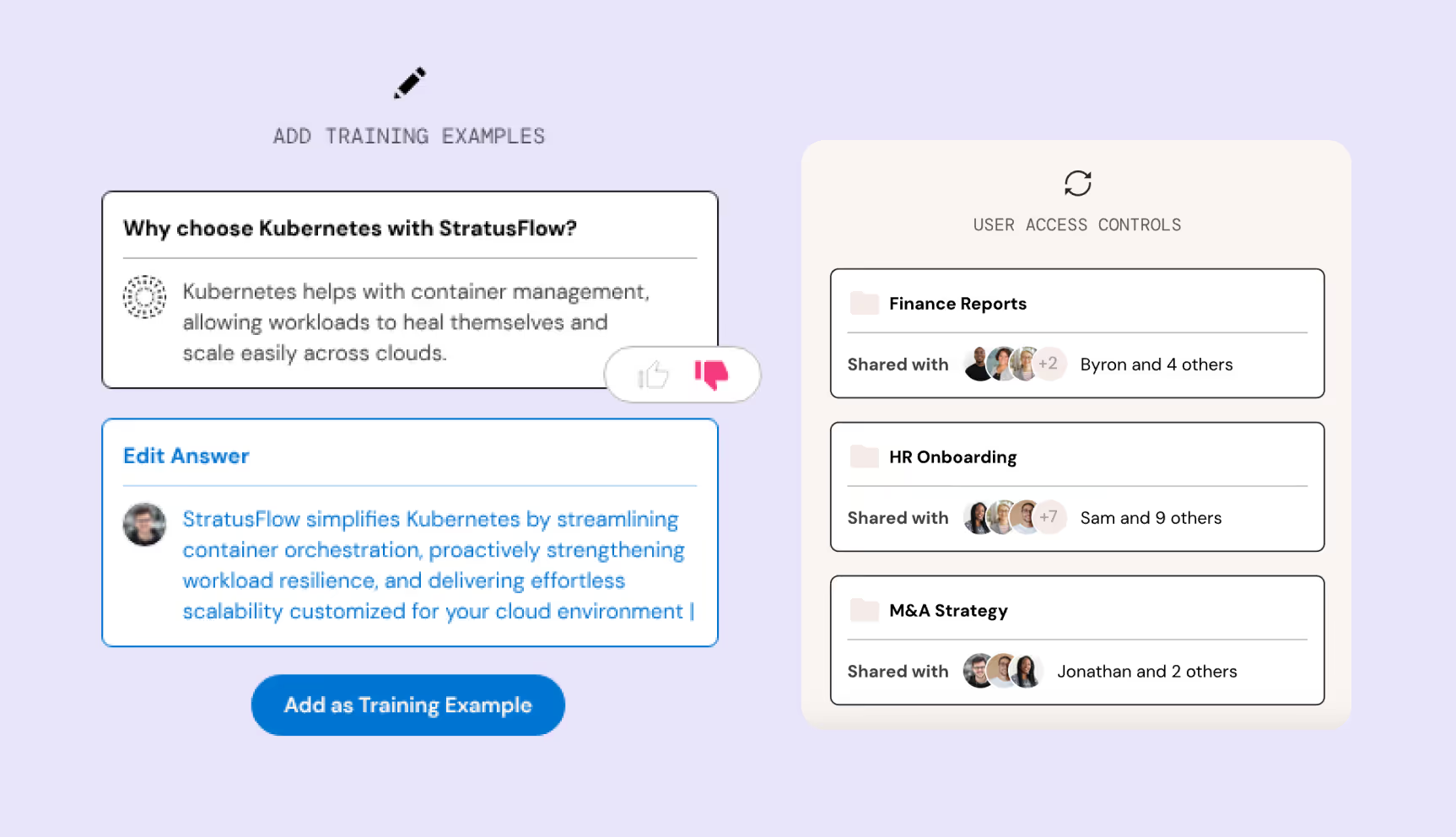
14. Doti
Doti is an agentic AI platform providing real-time answers and automation across Slack, Chrome, and APIs. Features Autopilot for proactive question answering in channels, hybrid search capabilities, and rapid deployment under one hour with strong security controls.
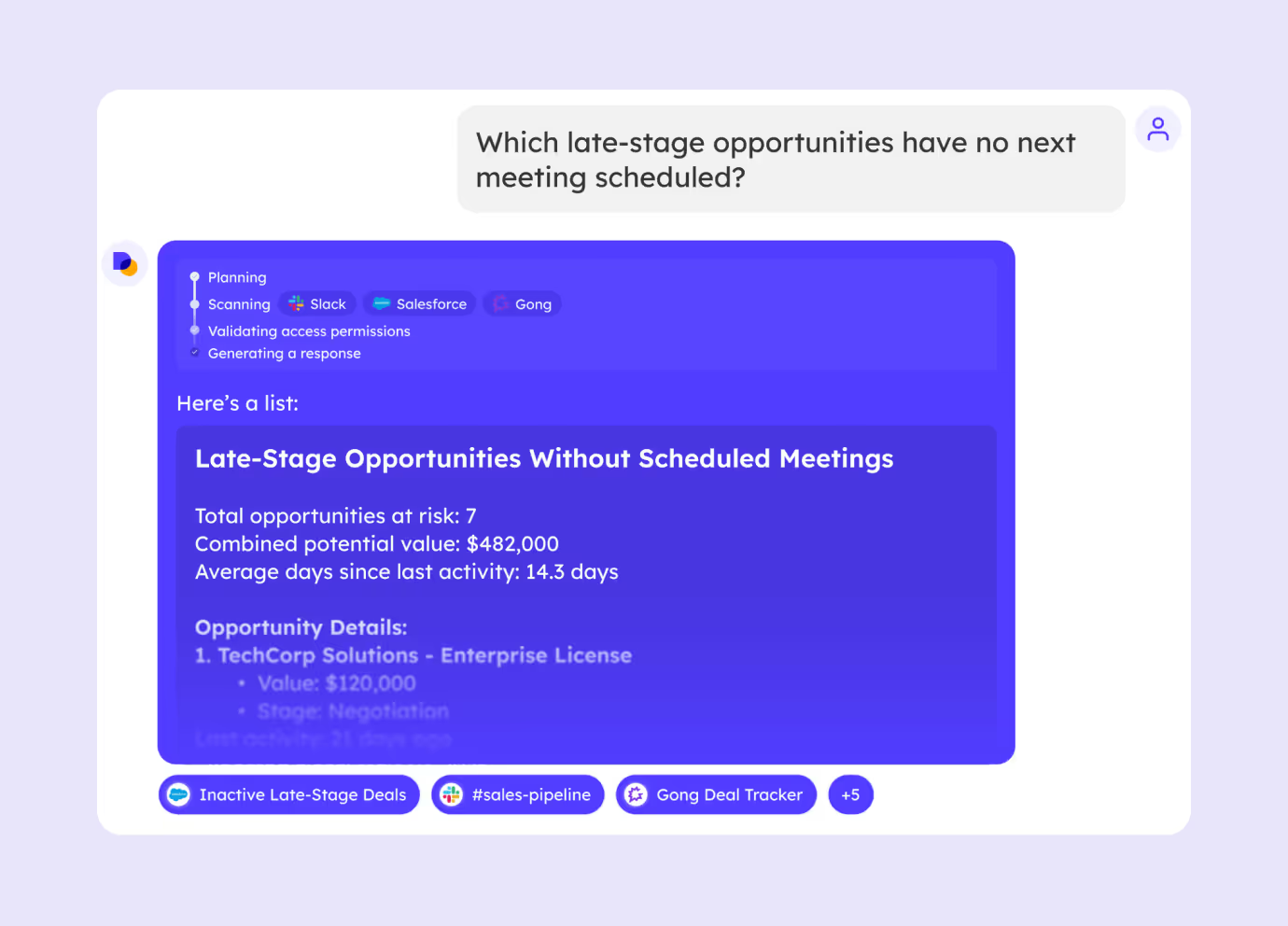
15. Mindbreeze
Mindbreeze is an enterprise-grade cognitive search platform recognized as Forrester Wave Leader. Combines traditional search with multimodal AI analysis of text, images, video, and audio. Trusted by 2,700+ companies for secure, highly flexible search with advanced tool calling capabilities.

Key considerations when choosing an enterprise search tool
Selecting the right enterprise search platform requires evaluating multiple technical and strategic factors that directly impact employee productivity and IT operational efficiency.
1. Connectivity and integrations
The best enterprise search platforms connect to your existing tech stack without forcing data migration or workflow changes. Look for pre-built connectors for core systems such as SharePoint, Confluence, Salesforce, Slack, and Google Workspace. Evaluate connector quality, not just quantity—can it sync permissions automatically and handle real-time updates, or only scheduled crawls?
2. AI and context awareness
Modern enterprise search should understand user intent, not just match keywords. When someone searches "laptop replacement," the system should know their role, location, and company policies to provide relevant procurement steps rather than generic hardware specs. Context-aware platforms like Atomicwork use organizational graphs to deliver answers based on user profiles and current situations. Look for natural language processing capabilities and semantic understanding that interprets questions the way employees actually ask them.
3. Security and compliance
Enterprise search tools access your most sensitive data, making security architecture critical. Verify that platforms inherit existing access controls rather than creating new permission systems. Role-based access should work at document, field, and even snippet levels. For regulated industries, check for SOC 2 Type II, GDPR compliance, HIPAA alignment, and other relevant certifications.
4. Knowledge governance
Outdated information creates compliance risks and reduces trust in search results. Advanced platforms automatically detect stale content, identify duplicates across systems, and flag missing documentation.
Look for workflows that route content updates to subject matter experts and maintain audit trails for regulatory requirements. Version control capabilities ensure teams continuously work with current information while preserving historical context when needed.
5. Analytics and ROI tracking
Measuring search effectiveness requires visibility into user behavior, content gaps, and business impact. Analytics should show which queries fail, what content gets used most, and how search adoption affects support ticket volume.
Atomicwork provides insights into failed searches and unused content, helping IT teams strategically optimize their knowledge base. Track metrics like time-to-answer, search success rates, and ticket deflection to demonstrate ROI to leadership and guide continuous improvement efforts.
6. Scalability and deployment
Consider both current needs and future growth to check if the platform handle your data volume and user base.
Cloud-native solutions typically scale more easily, while on-premises deployments offer greater control over sensitive data. Deployment speed matters for proving value quickly. Factor in latency requirements for global teams and integration complexity with existing infrastructure to avoid performance bottlenecks.
7. Vendor ecosystem and support
Evaluate the vendor's AI roadmap and integration partnerships. Rapidly evolving AI capabilities mean your platform should stay current with new model releases and enterprise tool integrations.
Consider vendor stability, customer support quality, and the partner ecosystem. Players like Microsoft and Google offer broad integrations. Still, they may lack specialized enterprise search features, while focused vendors often provide deeper functionality but require careful partnership evaluation for long-term success.
Conclusion
Enterprise search has fundamentally evolved from document retrieval to intelligent knowledge orchestration. Modern organizations need AI-driven platforms that understand context, respect permissions, and deliver actionable answers directly in workflow—not systems that dump lists of potentially relevant files.
The best enterprise search platforms combine three critical elements: AI-powered understanding that interprets natural language queries, contextual awareness that considers organizational roles and situations, and robust governance that maintains data quality while ensuring security compliance. This transforms search from a time-consuming hunt into instant knowledge delivery.
IT leaders should prioritize platforms that integrate seamlessly with existing infrastructure, provide measurable ROI through analytics, and adapt to rapidly evolving AI capabilities. Atomicwork is one such platform that combines the power of enterprise search and ITSM to help employees and IT teams function efficiently. You can sign up for a demo here!
Frequently asked questions
More resources on modern ITSM
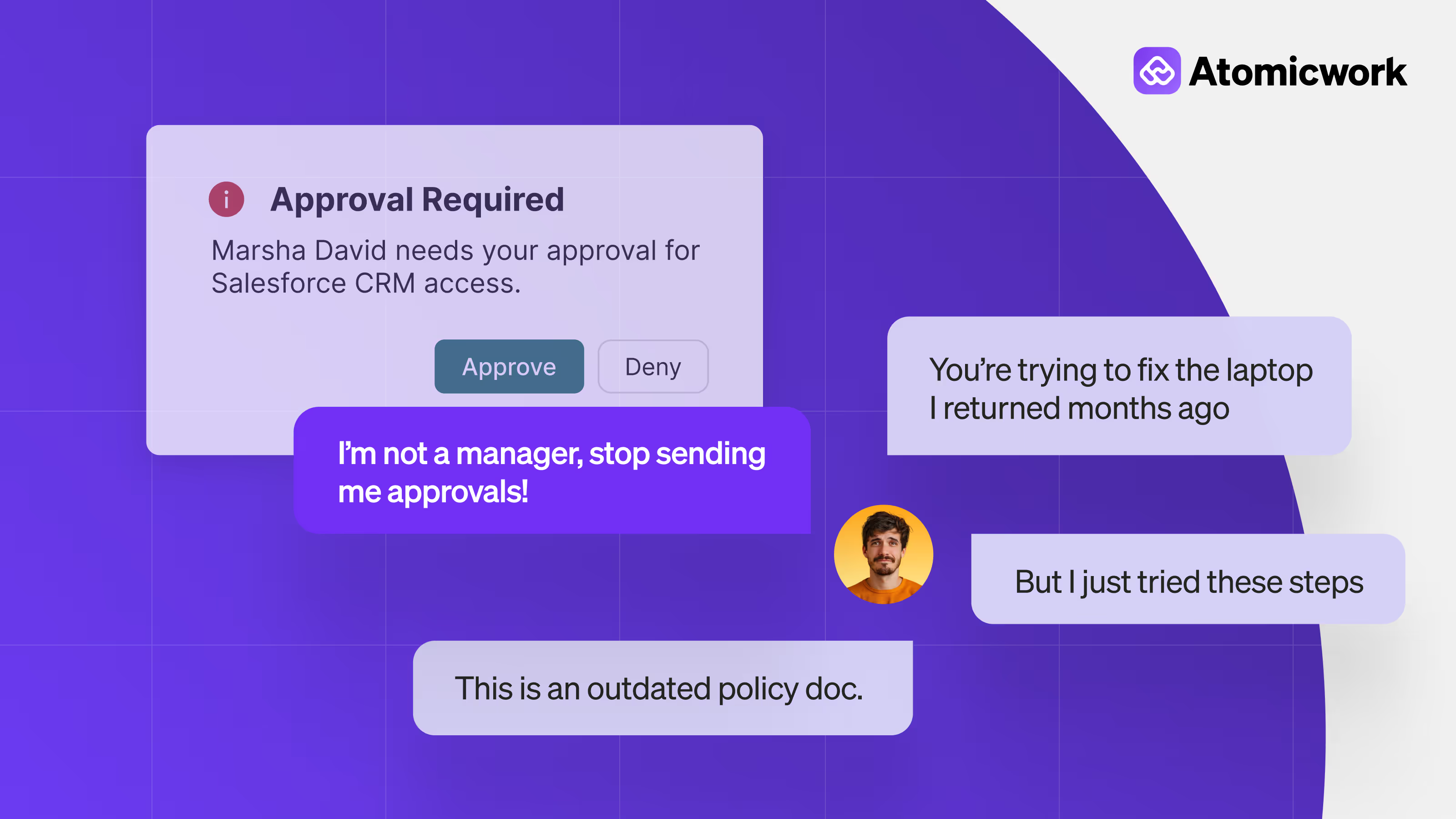
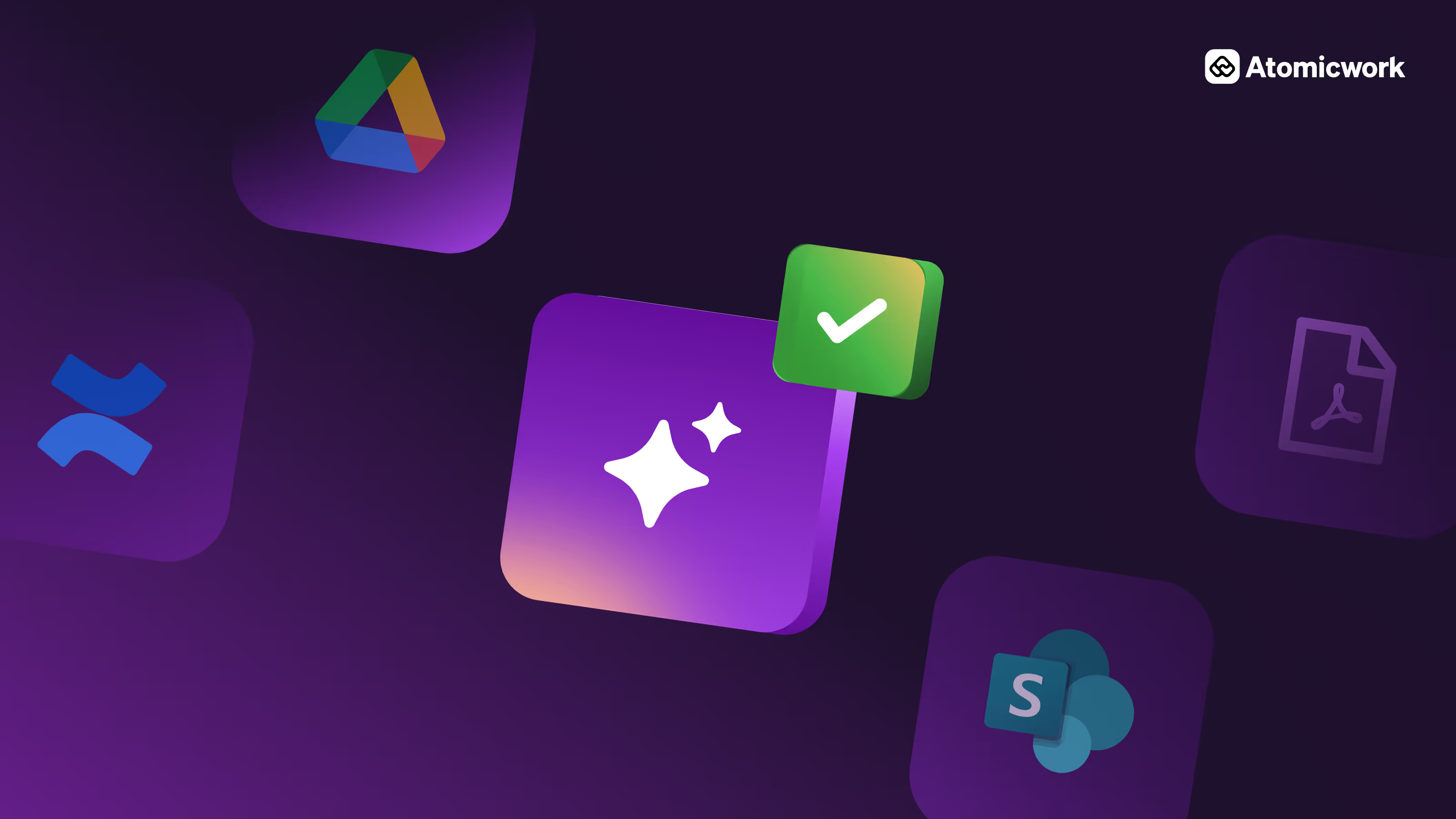


.avif)





























